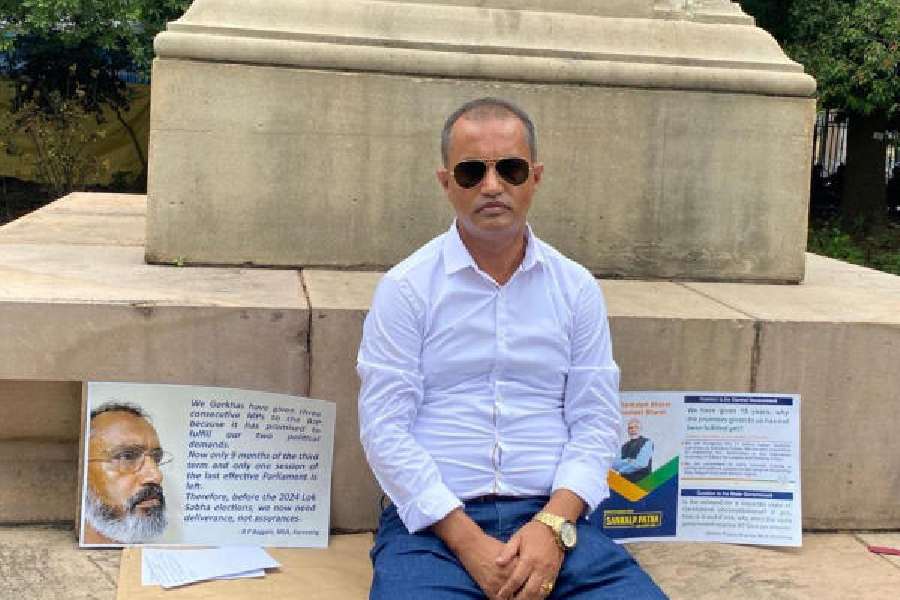Kurseong BJP MLA B.P. Sharma (Bajgain) staged a dharna on the premises of the Bengal Assembly on Friday to protest against the Centre’s failure to fulfil his party’s promises of finding a “permanent political solution” for the Darjeeling hills and according tribal status to 11 Gorkha communities.
“We, Gorkhas have given three consecutive MPs to the BJP because it had promised to fulfill our two political demands. Now only nine months of the third term and only one session of the last effective Parliament is left. Therefore, before the 2024 Lok Sabha elections, we now need deliverance, not assurances,” read a placard held by Sharma while he was holding a dharna near the statue of B.R. Ambedkar on the Assembly premises.
The MLA said he had remained silent in the past four years, “hoping that our promises would be fulfilled”.
In the manifesto for the 2019 general election, the BJP had promised to find “a permanent political solution” (PPS) for the hills, the Dooars and the Terai. Although the BJP hasn’t defined the PPS, Gorkhas interpret it as a Gorkhaland state. The party also promised tribal status to 11 Gorkha communities. The manifesto said seats would be reserved for the Gorkha communities of Tamang and Subba in the Sikkim Assembly — a promise which is yet to be fulfilled.
“We have given you 15 years, I wonder why our promises have not been fulfilled,” Sharma said, adding that his protest was not against the BJP but against the Centre.
Bengal BJP spokesman Samik Bhattacharya said Sharma’s protest was an aberration.
“Everyone knows the party’s stand. The MLA also knows the party’s stand. We are against the division of Bengal. What happened today was an aberration.”
The Kurseong MLA said recent election results were suggesting that the hill people were losing faith in the BJP. “In 2019, Darjeeling MP (Raju Bista of the BJP) had won by a margin of 4 lakh votes. After such a huge victory, the results of panchayat elections in the hills are there for all to see,” said the MLA.
The Bharatiya Gorkha Prajatantrik Morcha (BGPM) swept the recent rural elections in the hills.
Sharma mentioned the names of a number of organisations, including the allies of the BJP in the hills, which had started questioning the saffron party.
“I request the Prime Minister and the (Union) home ministry to hear the people’s voices. A few days ago, the Gorkhaland Activist Samhua held a demonstration in Delhi. The Gorkha Janmukti Morcha is holding protests on August 4, 5 and 6 (in Delhi). An apolitical youth, Bhawesh Bhujel, wants to start an indefinite hunger strike on the issue at Chowrasta (in Darjeeling) from August 22. The Gorkhaland Rajya Nirman Morcha (GRNM) has started a poster campaign on the delay (in fulfilling the promises), while the CPRM stated that it wanted nothing short of Gorkhaland. My support goes to all of them,” he said.
The GRNM and the CPRM are the allies of the BJP in the hills.
It is not that the Narendra Modi government at the Centre has remained
mute to similar demands in the country.
On September 5, 2021, the central and Assam governments inked a peace agreement with five Karbi-Anglong groups for the greater devolution of powers to the Karbi Anglong Autonomous Council. A special package of Rs 1,000 crore over the following five years was also promised in the pact.
Earlier, the Centre had signed three key peace accords with insurgent groups in the Northeast. An agreement was signed with the NLFT Tripura on August 10, 2019, while the Bru Accord was finalised on January 1, 2020, for the permanent settlement of the Bru families in Tripura. The Bodo Peace Accord was inked on January 27, 2020.
Sharma had even suggested to Darjeeling MP Raju Bista on January 13, 2023, that a private bill for the creation of Gorkhaland be placed in the Lok Sabha if the Centre was hesitant.
The Kurseong MLA noted that on July 8, 1986, Lok Sabha member Tilak Raj Singh had placed a private bill for creating Uttarakhand. Uttarakhand was finally carved out of Uttar Pradesh in 2000.
“Even the recognition of Nepali language in the 8th Schedule of the Constitution came after Dil Kumari Bhandari (an MP from Sikkim) placed a private member bill during the budget session (of Parliament) and the same was discussed and passed during the monsoon session in 1992,” said Sharma.











